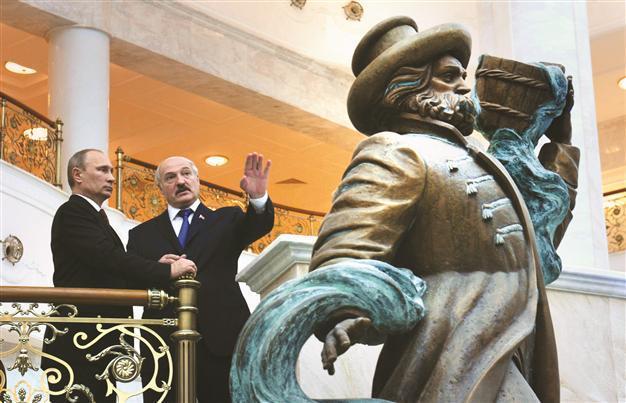Black Sea countries stuck between Russia and Europe
MUNICH – Hürriyet Daily News

Russian President Vladimir Putin (L) listens his Belarus counterpart Alexander Lukashenko as they meet in Lukashenko’s residence in Belarus. AFP Photo
More than two decades has passed since the end of the Cold War, yet a war of sorts appears to be continuing for some of the countries in the Black Sea basin, which seem squeezed between an assertive Russia that pushes for closer integration and a European Union that lacks a clear strategy toward the region.The EU’s policies jump from summit to summit, rather than being based on a vision of what this region needs, according to Jörg Forbrig from the German Marshall Fund’s Berlin’s office, in reference to the upcoming Vilnius summit in November, where the EU will decide whether or not to sign an association agreement with Ukraine.
“Enlargement from 2004 to 2007 was the EU’s biggest success, but the Black Sea is a failure,” he told a group of opinion makers from the region. The Eastern partnership designed by the EU to strengthen cooperation with Armenia, Azerbaijan, Belarus, Georgia, Moldova and Ukraine, is lukewarm and keeps these countries at an arm’s length, according to Forbrig. This ambiguity in turn leads the leaders of these countries to navigate between East and West. “Turn a little bit to the right and a little bit to the left to see which side is making a better offer,” he said.
Yet both the EU and Russia understand this and will push for a change of that behavior. Armenia, for instance, has given in to pressure from Russia and has announced that it will sign a customs agreement with Russia, a decision that will hamper both its economic and political ties with the EU. Ukraine recently approved an association agreement with the EU, which puts a customs union with Russia off the table, but the EU is yet to decide whether or not to sign the agreement, as it has been pushing for a reform of the judiciary and the electoral laws in Ukraine.
Coersive policies
Russia follows coersive policies while the EU makes an offer for cooperation which often comes with conditionality, said Hrant Kostanyan, from Chent University’s Centre for European Policy Studies.
The EU seeks a long term change in these countries for a transformation to democracies with the rule of law, Professor Mitat Çelikpala told the Daily News. The Russians, on the other hand, want to keep the region under their strict influence. Turkey is obviously another actor in the region. “Whenever we came together with the Russians and Turks about the region, they agreed on one message: ‘This is our sea, and all the rest should keep out,’” said Erhard Busek, former vice chancellor of Austria.
Just like Russia, Turkey does not want outside actors play a prevailing role in the region and it resisted U.S. attempts in the mid-2000s, according to Çelikpala. Turkey fears it cannot compete with other actors. “Turkey says, ‘I should be the actor to play a role in this region. That will also serve the interests of the West since I also want the region to transform toward endorsing values like democracy and the rule of law.’ It tells Europe to support and stand by Turkey,” said Çelikpala.
Meanwhile, the lack of a “Black Sea” identity becomes as an additional difficulty, as it complicates regional cooperation.
“What is missing is an overarching narrative that serves to identify it and to keep it together,” said Forbrig.This question of whether there is actually a regional consciousness is an issue less often addressed, said Sophia Petriashvili, from Tbilisi State University, who has tabled a research proposal to the Black Sea Young Reformers fellowship, supported by Istanbul’s Kadir Has University as well as Ludwig Maximilans University.
When dealing with regionalism, the perspective tends to be based on criteria such as physical boundaries, or institutional bases. When it comes to the Black Sea, the institutional basis is there but many agree that it has not taken regional cooperation in the Black Sea very far.
















